Sunday, August 19 my father passed away. He’d had some health issues so it wasn’t totally out of left field, but it’s obviously still a shock when it happens and doing all that needs to be done to put him to rest is quite difficult.
One thing that’s helping during a time like this is learning things about my dad I might not have known before from old friends and coworkers. It has also brought up a lot of memories that I haven’t thought of in a long time, and that has been cathartic. Since this is a column about Magic, I thought I would share some of how Dad impacted my love of gaming.
Strategy Amidst Randomness
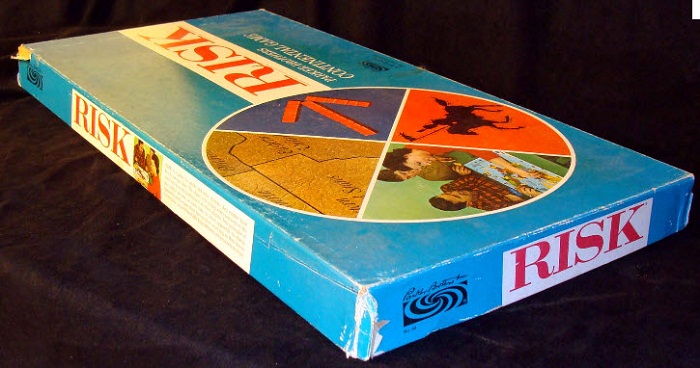
Some of my earliest memories related to game playing are connected to Dad. When I was working on a eulogy for Dad, one of the things I mentioned was Risk. Risk was a game I remember my father being obsessed with when I was a kid, and talking with some of my cousins after the memorial service it apparently was something that my Dad played with his brothers and sisters when they were younger (and subsequently they taught their children the game as well).
I can remember as a child being fascinated by the board and the epic feel of the game play—this was the freaking world we were battling over! My love of geography and maps may have its seeds in the Risk board. But more importantly, Risk taught me that even with the inherent randomness of your starting position and the rolling of dice to resolve conflict, the structure of the game presents certain strategic implications that you can utilize to improve your chances at winning.
I can vividly remember a game when it occurred to me why Dad always seemed to try to take over and fortify Australia even though it was the smallest continent. Dad wasn’t one to throw games just because we were kids so he won quite a lot, but that always drove me to think about the game afterwards to try to figure out what I was doing wrong and what he was doing right.
I always got into fights trying to take over Asia and Europe. The rush of excitement when you were able to get that huge army bonus from controlling those continents always made you feel like you were king of the world. But it so rarely actually happened—why? Because Asia and Europe were large continents with tons of paths opponents could attack you from, so unless it was quite late in the game, it was impossible to properly defend.
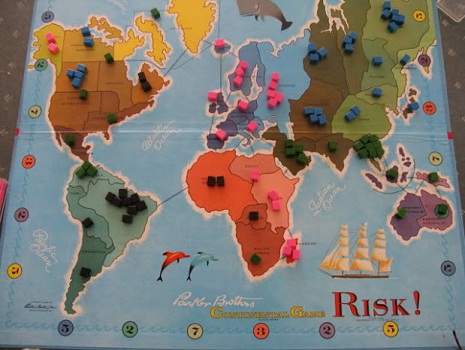
Then there was Australia. While South America offered the same number of bonus armies for controlling it, South America had two fronts it had to defend. Australia only had one front. If you really wanted to make sure no one could mess with your stranglehold over Australia, you could do it quite easily. Even though controlling Australia gave you relatively few bonus armies, you could guarantee those armies every turn if you were diligent, and over the course of the game those consistent bonuses could really add up.
When that notion clicked with me, I fought Dad over Australia. I lost that fight, but the next game I managed to win Australia and secure it as my power base. I didn’t end up winning the game, but I had a good run, and I can remember Dad smiling at how well I did and how excited I got.
It’s interesting to me now thinking about the parallels between what I loved about Risk and what I love about Magic. Both have tactics and strategies that improve your chance of winning…but both also have strong random elements that not only make each game fresh and unique but can also just throw a huge curveball into how the games play out. Dad also taught me chess, and while I enjoyed it, I didn’t like it nearly as much as I did Risk and other games with chance and luck built in, games I learned to love later on, games like Shogun (later renamed Samurai Swords and Ikusa) and Supremacy.
That element of chance provides the weaker player the hope that they might pull out a win, while also denying the stronger player the comfort of being secure in his or her victory. I think this makes for a much more exciting and enjoyable game and one of many reasons I think Magic has done so well since its inception. Sometimes Jon Finkel has some really crappy draws and loses the game, and whether you’re playing against Jon Finkel or are Jon Finkel, that fact makes the game much more exciting than it would if it were just a strict battle of talent and skill.
Card Game
One thing I just recently discovered about Dad while reading an old journal of his that I found was that he played Bridge in his younger days. I can remember learning card games like Rummy from Mom and Dad as a kid and really liking them, but learning games with tricks like Hearts and bidding like Spades really pushed things to another level for me. Bridge always used to evoke images of old ladies sitting calmly around a table sipping tea and gossiping between hands, but the first time I actually watched a game of Bridge was completely different.
I was in college and had gravitated towards a group of card players who regularly gathered at the student commons each day. I’d reacquainted myself with Hearts and Spades and gotten pretty good at both fairly quickly. Then a group of the guys started playing Bridge…and watching the games was exciting! The bidding was intense, with a fair amount of trash talking and swagger, and things got even more heated and loud when the games played out. If someone made a really high bid, the stakes were really raised and things got tense.
After watching a few games I begged someone to teach me to play and took to it like a fish to water. While there are certainly "orthodox" ways to play Bridge, you can also develop your own style and manner that makes playing with or against different players fresh and fun.
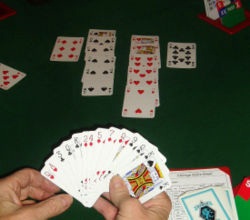
The thing about Bridge (and to some extant Spades and Hearts, which I actually played more frequently because the Bridge crew was a small minority of the card playing gang) thinking back is that it really opened up my mind to how much more complex and fun card games could be from the simpler card games I learned in my youth. I think about not just the games itself but the interactions with the other players, and it reminds me very much of how we interact in games of Magic—sure, there is the "shuffle up and deal" randomness of each individual game, but then there is the social aspect, reading your opponents, learning their style and preferences, talking trash and bragging, or sharing the thrill of watching someone make a great play even if they’re playing against you.
I remember watching an opponent successfully bid and play out a Grand Slam, which means you take all 13 tricks in the game (each trick consists of each four players playing a card each turn). It’s incredibly rare to get the cards to do it and incredibly hard to recognize during the bidding and then successfully navigate the bid…and then actually successfully play it out. I can still remember bidding and playing my one and only Small Slam, which means taking 12 of the 13 tricks, and is still a huge accomplishment in Bridge.
Card games with bidding are always exciting because of the tension between how many points you can make by accurately bidding and making your bid and how many points you can lose by not making your bid. While you can be very conservative in your bidding and minimize the risks in not making your bid, you don’t get nearly as many points playing that way (and sometimes there are sandbag rules where you can lose points by accumulating too many underbids).
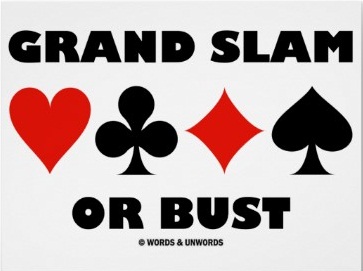
It made me wonder what sort of Bridge player Dad was and wish that we could have played some hands together. And it made me wonder about the ol’ "nature vs. nurture" conundrum. I know he nurtured in me a love of board games like Risk, but it seemed that my love of card games might have just been in my blood. In a lot of ways, Magic is the gaming destination I was born to walk towards, and my father played a big role in setting me on that path. Thanks Dad, for that and so much more. You will be missed but will always be with me, not just in my memory but in the games I play with the friends I’ve made and the children I’m raising to also be gamers.
The Golgari Way
If you haven’t been to your Planeswalker Points page lately, you should go check it out—Wizards of the Coast is letting us pick guilds to tie into Return to Ravnica. I’m sure it won’t shock many people to learn I immediately joined up with my homeboys the Golgari. Green and black have been my peanut butter and chocolate for nearly my entire Magic career, ever since a good friend of mine suggested I add black to my deck for Oath of Ghouls, Recurring Nightmare, and Living Death in order to get back all the sweet green creatures I played that always died horrible deaths at the hands of those pesky control players.
When Ravnica first came out, I immediately loved dredge and made Top 4 with the first iteration of Dredge before it got combo-fied. While scavenge isn’t nearly as weird and wonderful a mechanic as dredge, I’m certainly looking forward to exploring what the green and black guild has to offer us this fall. After I signed on as Golgari, it made me realize the guild is very apropos to what’s recently happened in my life—the guild is about the cycle of life and death, and my father’s passing has me thinking about both quite a bit. But when it comes to Magic, I can’t help but think that, in the wake of Innistrad, aligning myself with a guild that draws power both from creatures in play and cards from the graveyard is a wise move. Won’t you join me and the Golgari Swarm?
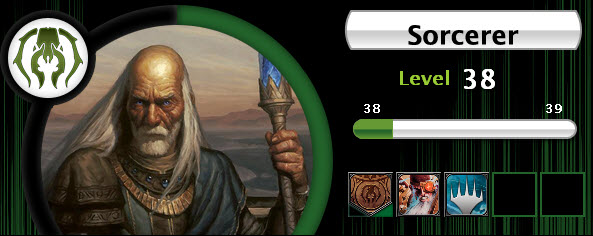
Join me next week as the buzz for Return to Ravnica really starts to heat up! Have a great holiday weekend, and stay safe.
Take care,
Bennie
starcitygeezer AT gmail DOT com
Make sure to follow my Twitter feed (@blairwitchgreen). I check it often so feel free to send me feedback, ideas, and random thoughts. I’ve also created a Facebook page where I’ll be posting up deck ideas and will happily discuss Magic, life, or anything else you want to talk about!
New to Commander?
If you’re just curious about the format, building your first deck, or trying to take your Commander deck up a notch, here are some handy links:
- Commander Primer Part 1 (Why play Commander? Rules Overview, Picking your Commander)
- Commander Primer Part 2 (Mana Requirements, Randomness, Card Advantage)
- Commander Primer Part 3Â (Power vs. Synergy, Griefing, Staples, Building a Doran Deck)
- Commander Starter Kits 1 (kick start your allied two-color decks for $25)
- Commander Starter Kits 2 (kick start your enemy two-color decks for $25)
- Commander Starter Kits 3 (kick start your shard three-color decks for $25)
My current Commander decks (and links to decklists):
- Nefarox, Overlord of Grixis (evil and Spike-ish)
- Yeva, Nature’s Herald (living at instant speed)
- Johan (Cat Breath of the Infinite)
- Riku of Two Reflections (steal all permanents with Deadeye Navigator + Zealous Conscripts)
- Phelddagrif (Mean Hippo)
- Sigarda, Host of Herons (Equipment-centric Voltron)
- Bruna, Light of Alabaster (Aura-centric Voltron)
- Niv-Mizzet, the Firemind (Chuck’s somewhat vicious deck)
Previous Commander decks currently on hiatus:
- Ruhan of the Fomori (lots of equipment and infinite attack steps)
- Phage the Untouchable (actually casting Phage from Command Zone!)
- Ghave, Guru of Spores (Melira Combo)
- Glissa, the Traitor (undying artifacts!)
- Grimgrin, Corpse-Born (Necrotic Ooze Combo)
- Damia, Sage of Stone (Ice Cauldron shenanigans)
- Geist of Saint Traft (Voltron-ish)
- Glissa Sunseeker (death to artifacts!)
- Jor Kadeen, the Prevailer (replacing Brion Stoutarm in Mo’ Myrs)
- Thelon of Havenwood (Campfire Spores)
- Melira, Sylvok Outcast (combo killa)
- Konda, Lord of Eiganjo (The Indestructibles)
- Vorosh, the Hunter (proliferaTION)
- Progenitus (Fist of Suns and Bringers)
- Savra, Queen of the Golgari (Demons)
- Uril, the Miststalker (my "more competitive" deck)
